Spread a little love this Valentine's Day…
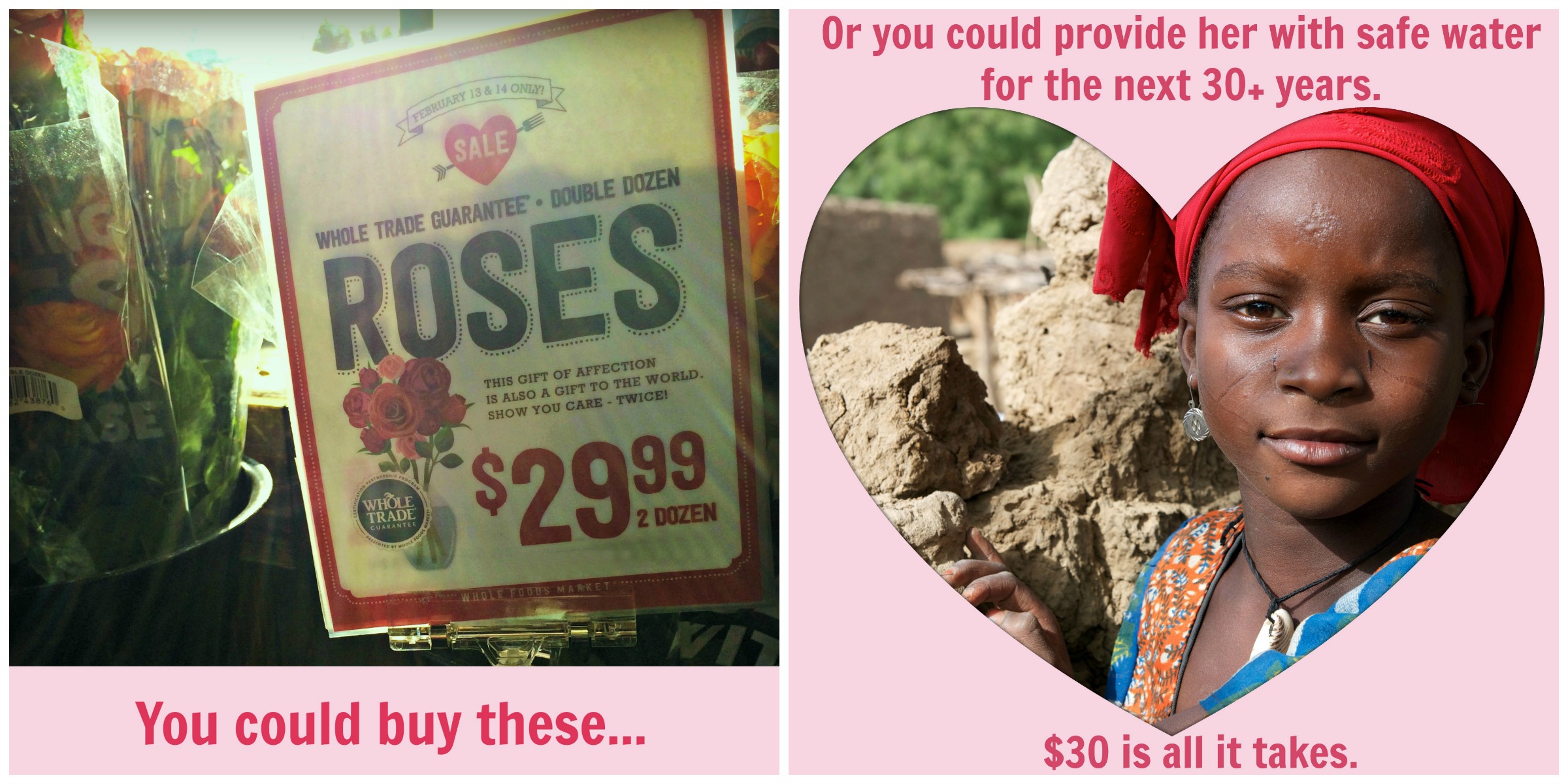 |
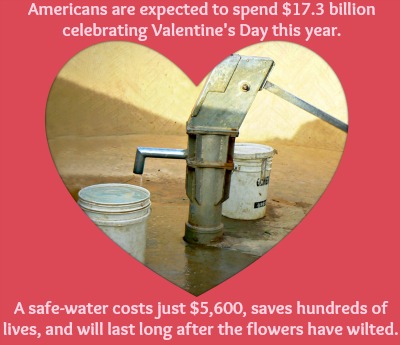 |
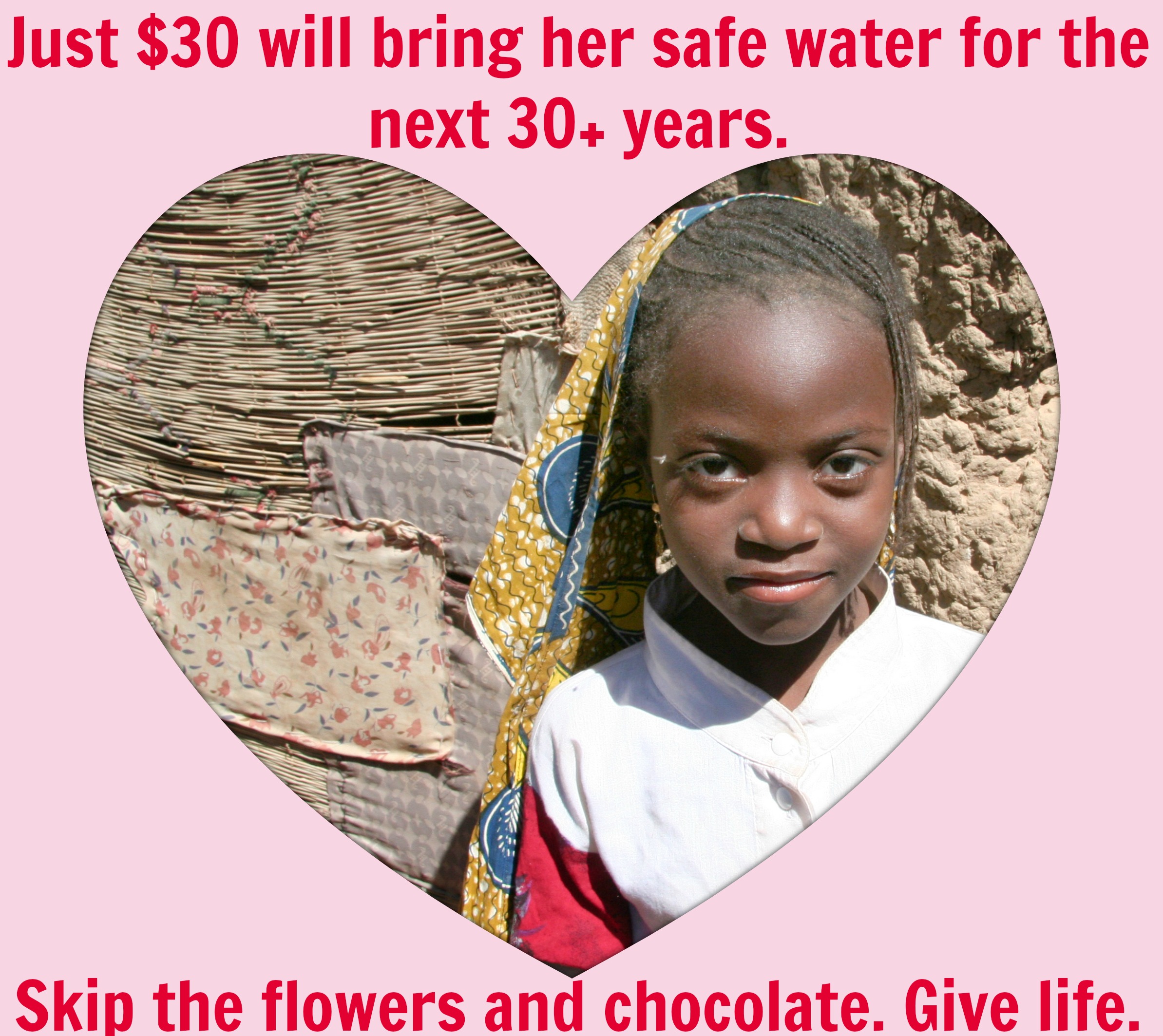 |
Posted by Wells Bring Hope Team
Spread a little love this Valentine's Day…
 |
 |
 |
Posted by Wells Bring Hope Team
by Stella Salguero-Ramirez
 Showering is no longer a soothing experience for me. I used to think in the shower, sing in the shower; sometimes I would even fall asleep in the shower. Now the only thing that keeps circulating my mind is “why did I even do that?” We all do it. We’re all guilty of falling into the trap of a warm, enticing, pore-opening experience, but when we realize that many people in the world don’t have this luxury, why exploit it? Becoming aware of how much water we use on a daily basis is crucial. It all depends on the showerhead you’re using, but on average we’re using around 3-5 gallons a MINUTE! I know some people that love to take hour-long showers! The people of Niger would be horrified to see all of that priceless water disappearing down the drains of our showers. While we can’t send any water that we conserve to West Africa, being conscientious and acknowledging that water is a precious gift is so important because while we are fortunate to live in a country where we have safe, clean water in abundance, it is not an inexhaustible resource.
Showering is no longer a soothing experience for me. I used to think in the shower, sing in the shower; sometimes I would even fall asleep in the shower. Now the only thing that keeps circulating my mind is “why did I even do that?” We all do it. We’re all guilty of falling into the trap of a warm, enticing, pore-opening experience, but when we realize that many people in the world don’t have this luxury, why exploit it? Becoming aware of how much water we use on a daily basis is crucial. It all depends on the showerhead you’re using, but on average we’re using around 3-5 gallons a MINUTE! I know some people that love to take hour-long showers! The people of Niger would be horrified to see all of that priceless water disappearing down the drains of our showers. While we can’t send any water that we conserve to West Africa, being conscientious and acknowledging that water is a precious gift is so important because while we are fortunate to live in a country where we have safe, clean water in abundance, it is not an inexhaustible resource.
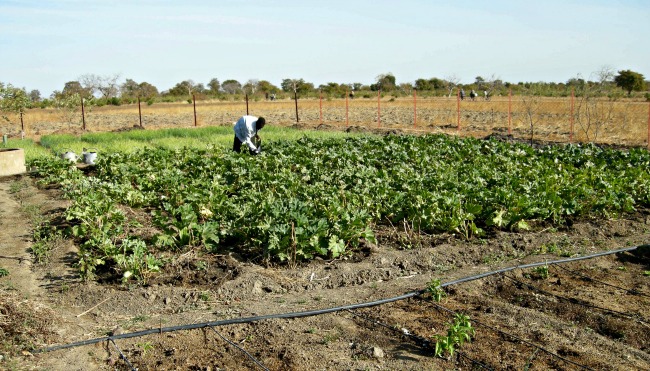 |
Whenever we drill a well, we teach the people living in the village how to make use of every droplet of water. Water is scarce, and every single drop counts. One of the ways we do this is by teaching them that the water that has been used for washing should not be discarded because while it is no longer potable, it can still serve a valuable purpose. This use of greywater, the water collected from hand washing stations, dish washing, and other household washing, is essential in drought-ridden West Africa. In every village where we drill, we teach the villagers how to use this greywater to nurture their gardens using the technique of drip water irrigation. This simple form of technology increases the efficiency of water usage and produces incredible benefits. This system relies on simple buckets or trash bins- to act as water reservoirs- and drip tape, which is placed between every other row of crops. The drip tape is attached to the water source, and allows for low-pressure water to trickle down to the soil, nourish the vegetation, and ultimately deliver produce that is packed with nutritious benefits to supplement the villagers’ diets.

The next time you are tempted to linger in the shower, take a moment to reflect on the value of this resource that we so often take for granted. Better yet, challenge yourself to take shorter showers, and make a donation to Wells Bring Hope for every day that you don’t reach your goal!
Sources
Shower Facts
Man of Peace Development – Drip Irrigation in Africa
Drip Irrigation Improves Africa Food Production
Save
Save
Posted by Wells Bring Hope Team
by Hadiara Diallo
In early January of 2013, I traveled to Niger, West Africa to follow up on the work of Wells Bring Hope and spend time with its local partner, World Vision. The visit led me to some remarkable, hard-working women who had benefited from a well that we drilled and I was fortunate to be able to witness some of the work that they are not able to do, with their time freed up from walking for water.
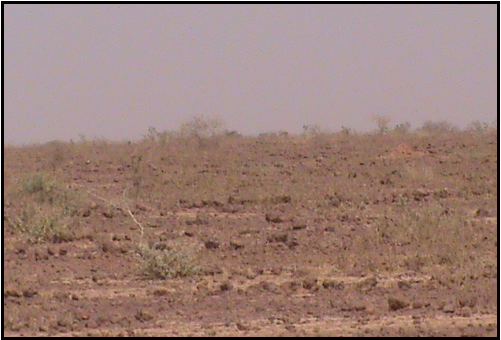 |
| The desolate landscape and rocky roads make for challenging travel. |
One of our many stops was Gatawane in the region of Tillaberi. The village is two hours north of the capital of Niamey and close to the Malian border. The main road leading to Gatawane was in great condition, but as soon as we saw the sign announcing our intended destination, we veered onto an unpaved, rocky road to meet the people of Gatawane who were eagerly expecting us.
Months earlier, the village had received the life-saving gift of a borehole well that is now providing clean, safe water to the whole village. Close to 1,650 lives have been transformed since the drilling of this well. My arrival, along with the World Vision staff, was a chance for the villagers to express their gratitude and a chance for me to reveal to the village that their benefactor was as we dedicated the well to the Adami/Robertson family. Laurie, Ben and Gus have been staunch supporters of Wells Bring Hope for several years, and this is the second well that they have provided for the people of rural Niger.
Gatawane is a very special place because from 2004 to 2011, the area has seen environmental changes that have negatively impacted life and livelihood for the local population. The region has registered decreasing rains as well as very high and dry winds that erode the ground and make the land infertile. A locust invasion depleted several harvests, and due to the proximity to the Malian border, bovine theft is not uncommon. This series of disasters was interrupted in the later part of 2012 when Wells Bring Hope funded the drilling of a much-needed borehole well. This ray of hope marks the beginning of the end of many of the village’s problems.
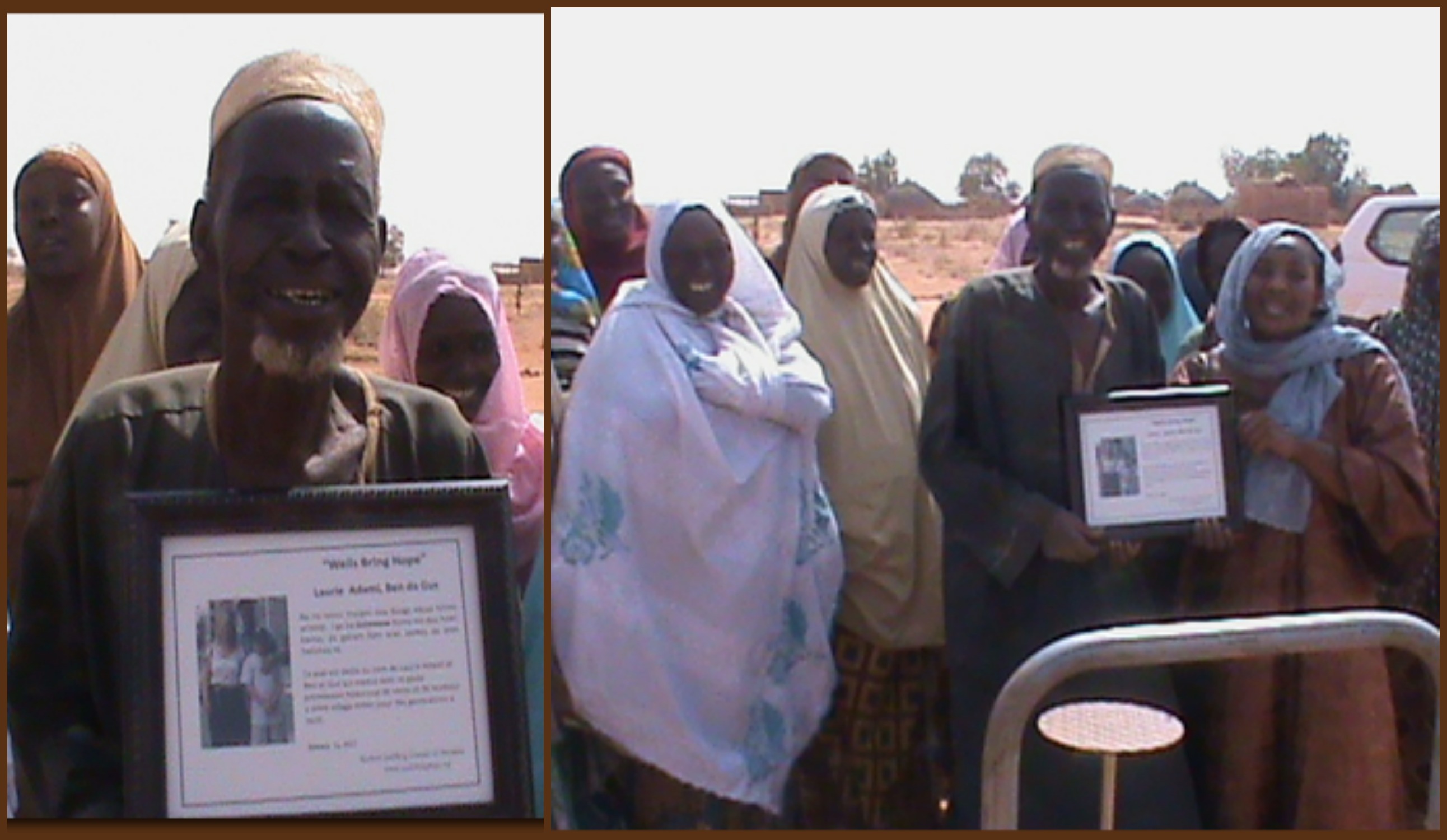 |
Now that the women have easy access to safe water, their days are no longer consumed with walking endless miles to retrieve water that is dirty, murky, and often contaminated. The children of Gatawane will now avoid the deadly diseases that are associated with unsafe water, and the girls of the village are now free to attend school.
As soon as we arrived in Gatawane, we were lead toward the new well. As we walked towards it, I could feel the ground shaking as the women of the village stomped and danced in celebration and gratitude. There is a special sound uttered by the women of Gatawane to express their sheer joy; it is not a whistle, nor is it a chirping sound, rather it is a kind of indescribable special expression that makes everyone want to join in the excitement by clapping and dancing.

The village chief, the mayor, and local dignitaries from neighboring villages were present along with a crowd of mostly women who delayed beginning their work in the garden so they could participate in this memorable event. After our introductions, I walked through the crowd and displayed the Wells Bring Hope certificate showing the picture of the Adami/Robertson family. I then handed the certificate to the village chief and told him about this family’s long-standing involvement with our organization and their enduring support for the women of Niger.
I spoke about their dedication to the cause, which led to this second well for the people of Niger. All of the villagers wanted to get closer to take a peek at the photograph. There was a clear surprise, awe, and curiosity on many faces. The chief expressed his happiness for having a well in his village and thanked the Adami/Robertsons for their unwavering support. He wished many blessings onto the family of strangers who stepped in and took on Gatawane’s cause.
Save
Save
Posted by Wells Bring Hope Team
by Hadiara Diallo
Do you remember the water fountains in the halls of your school, where you could just stop and take a few gulps? Kids in Niger don’t have that luxury. However, if they’re lucky enough to attend Simiri Junior High School, 50 miles outside of the capital of Niamey, they can drink water from a well drilled especially for their use by Wells Bring Hope.
The school in Simiri is a co-ed junior high school serving 392 students in 6th through 9th grades. It was built only about five years ago, so the stucco and the brown and blue paint are still gleaming. The school grounds are very clean and the students take great pride in keeping them that way.
It was an honor for me to participate in the dedication of the well in Simiri CEG. During the recess, everyone gathered around the well and the school administrators introduced me to the students. I spoke to them about Wells Bring Hope and what the organization stands for. I also shared with them the name of their benefactor, Kareem Ahmed, who single-handedly financed this and many other wells in Niger. It was quite a moment to experience; the reaction was swift, the kids immediately started to clap and cheer, shouting “Merci, Mr. Kareem.”

As I was passing the dedication certificate around, three boisterous boys, Boubacar Yaye, Salamatou Boubacar and Sakiya Gado became my sidekicks. They shared with me what it meant to have a well on their school grounds. Besides providing them with a clean source of water for drinking, sanitation facilities were also installed in the school so that girls in particular had the privacy they so badly needed. Having a well at their school also meant that they could carry back water to their families on the way home. After the dedication, I was shown the recently planted trees that the students hoped will provide them with shade and help contribute to the fight against desertification. Irrigation provided by the well has made this possible.

I am in awe at the maturity and level headedness of the students at Simiri CEG who have been given a chance at a higher education. They are the privileged ones. In Niger, few children go beyond primary school. The Simiri CEG students are thriving and know that they have the opportunity to become anything they want to become. After graduation, they have the possibility of going to high school in Ouallam, only 20 kilometers away; or they may choose to attend an accelerated teacher training program. Clearly, they have HOPE for their futures.
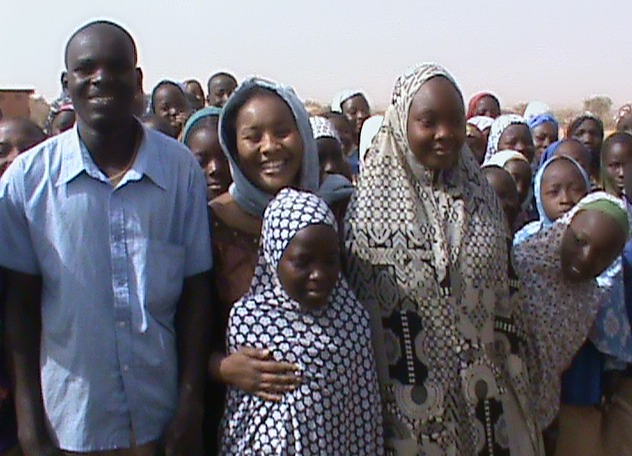 |
One of the major benefits of drilling a borehole well in a village is that girls no longer have to walk miles to get water; they can go to school and become educated. During my visit, I talked with Assistant Principal Mr. Garba Seyni as well as Mr. Gado Issa, the School Supervisor, about the government-led effort to increase the attendance and retention of girls. To help support this effort, each parent enters into a contract with the school, promising that they will not withdraw their daughters for early marriage. This is a major step for my country, and I am so proud to witness such a clear shift in cultural and social behaviors; education for young girls is becoming a priority for ALL.
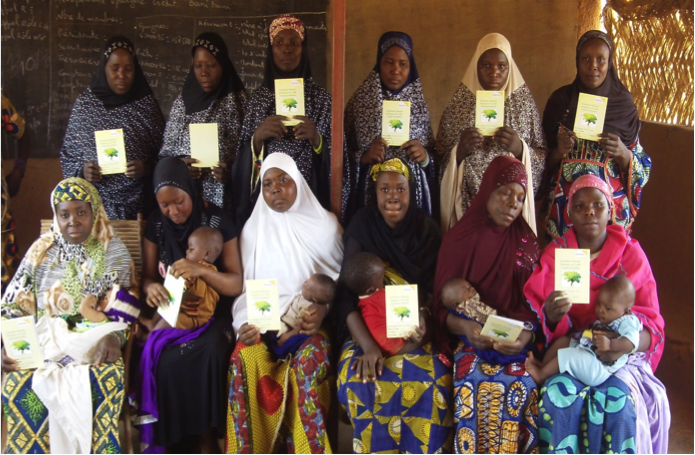 |
In addition to all of the improvements the new well has provided in the area of education, it has also brought with it new opportunities for women. In every village where Wells Bring Hope drills a well, women are provided with microfinance tools and education so that they can work toward opening small businesses, and Simiri is no different. After the well was drilled in Simiri, the women of the village came together to form savings groups called “bani-bani,” which literally means “peace-peace.” These savings groups allow the women to gain the knowledge they need to establish and sustain micro-economic institutions while serving to bring women of different age groups together in a spirit of participation and cooperation.
The main goal of these groups is to improve the socio-economic environment by establishing a village-based microfinance institution that allows members to acquire gardens and grow food, ensuring that families in Simiri have enough to eat. All of this was made possible by one generous donation of $5,600! Thank you, Mr. Kareem Ahmed!
Save
Posted by Wells Bring Hope Team
by Kate Cusimano
Yesterday was World AIDS Day, and as we celebrate how far we have come in fighting and preventing this disease, it is important to remember how significant a problem it continues to be, particularly in Africa. According to the UN AIDS Report, more than 70% of the persons infected with HIV worldwide live in Sub-Saharan Africa as did 90% of the 210,000 children under the age of 15 who died of AIDS-related causes last year.
These statistics serve to highlight the fact that along with a lack of clean water, AIDS continues to be a serious challenge across Africa. In fact, these two issues go hand-in-hand. The risks associated with a lack of sanitation and consumption of contaminated water are exponentially more dangerous to a person whose immune system is compromised by HIV or AIDS. Access to clean water is always a matter of life and death, but if an individual with HIV/AIDS hopes to have a chance at survival, he or she must have clean water for drinking, cooking, and bathing.
In addition to the obvious health benefits it provides, a new well results in increased female empowerment and improved access to education, two factors that are also associated with a decreased risk of contracting HIV/AIDS. Because it is so fundamental to our survival, it is easy to lose sight of the many ways in which water and the lack of it shape our communities. So, as we mark the 25th annual World AIDS Day, let us stop to consider the many ways we can contribute to the fight against this devastating disease.
Posted by Wells Bring Hope Team
by Barbara Goldberg
Just two weeks ago, I reported some very good news: Niger has made the most progress worldwide on reducing child mortality since 1990, according to a recently released study. Now for the bad news. In its annual report released on November 6th, the UN Population Fund revealed that Niger had the world’s highest childhood pregnancy rate, with 51 per cent of women in their 20s reporting that they gave birth before turning 18.
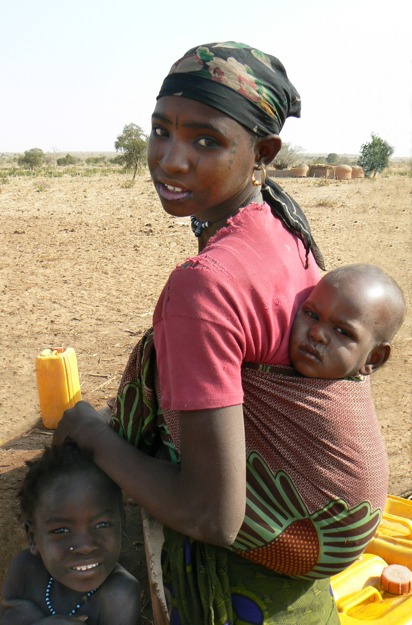 |
| Photo by Barbara Goldberg |
Every year, 7.3 million children become mothers in developing countries. Some 70,000 mothers between 15 and 19 die from complications after birth each year. Having children at a young age prevents girls from entering the work force, and thus the countries they live in are deprived of their potential contribution to the economy. If girls waited until the age of 20 to have a child, the gross annual income would be boosted by more than $7.7 billion in India and $3.5 billion in Brazil, the report found.
UNFPA chief Babatunde Osotimehin stressed that poverty, along with discrimination against women, is a key cause of childhood pregnancies. “Too often, society blames only the girl for getting pregnant,’’ he said. “The reality is that adolescent pregnancy is most often not the result of a deliberate choice, but rather the absence of choices, and of circumstances beyond a girl’s control.”
 |
Wells Bring Hope aims to expand those choices for the girls of Niger. When we drill a well, girls no longer need to walk for water, so they are able to go to school, often for the first time in the history of the village. Education is the key to opening up new choices and opportunities for women and girls. When girls go to school, they tend to marry later and have children later, opting instead to engage in economic activities that pull their families out of dire poverty. That’s the connection between drilling wells, empowering women, and growing the economy of the world’s poorest country.
Save
Posted by Wells Bring Hope Team
On Sunday, at the home of Gil and Sukey Garcetti, Wells Bring Hope celebrated its fifth anniversary and the drilling of 200 wells since we began in 2008. Our guest of honor was Kareem Ahmed, an incredible philanthropist and humanitarian and our largest donor.
Thanks to our wonderful supporters and tireless volunteers, the event was a huge success! Our goal was to raise money for 40 wells but thanks to the generosity of our supporters, we reached 63 wells, over $350,000, an amount far beyond our expectations! Special thanks to Debrah Lemattre of Stretch Media for capturing the festive atmosphere in all of these photographs!
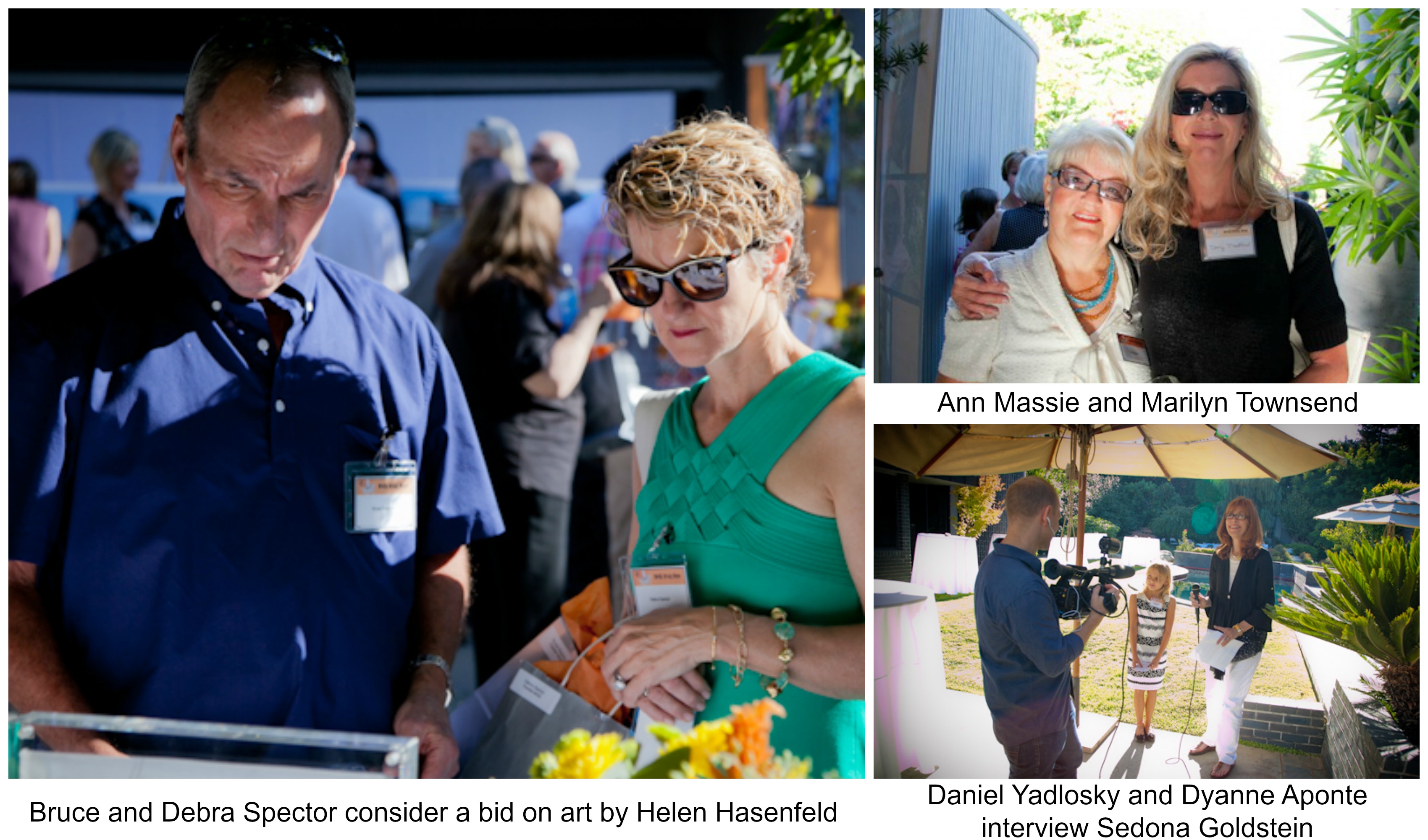 |
Craig’s Crew provided us with lots of delicious food and kept the wine and Arnold Palmers flowing.
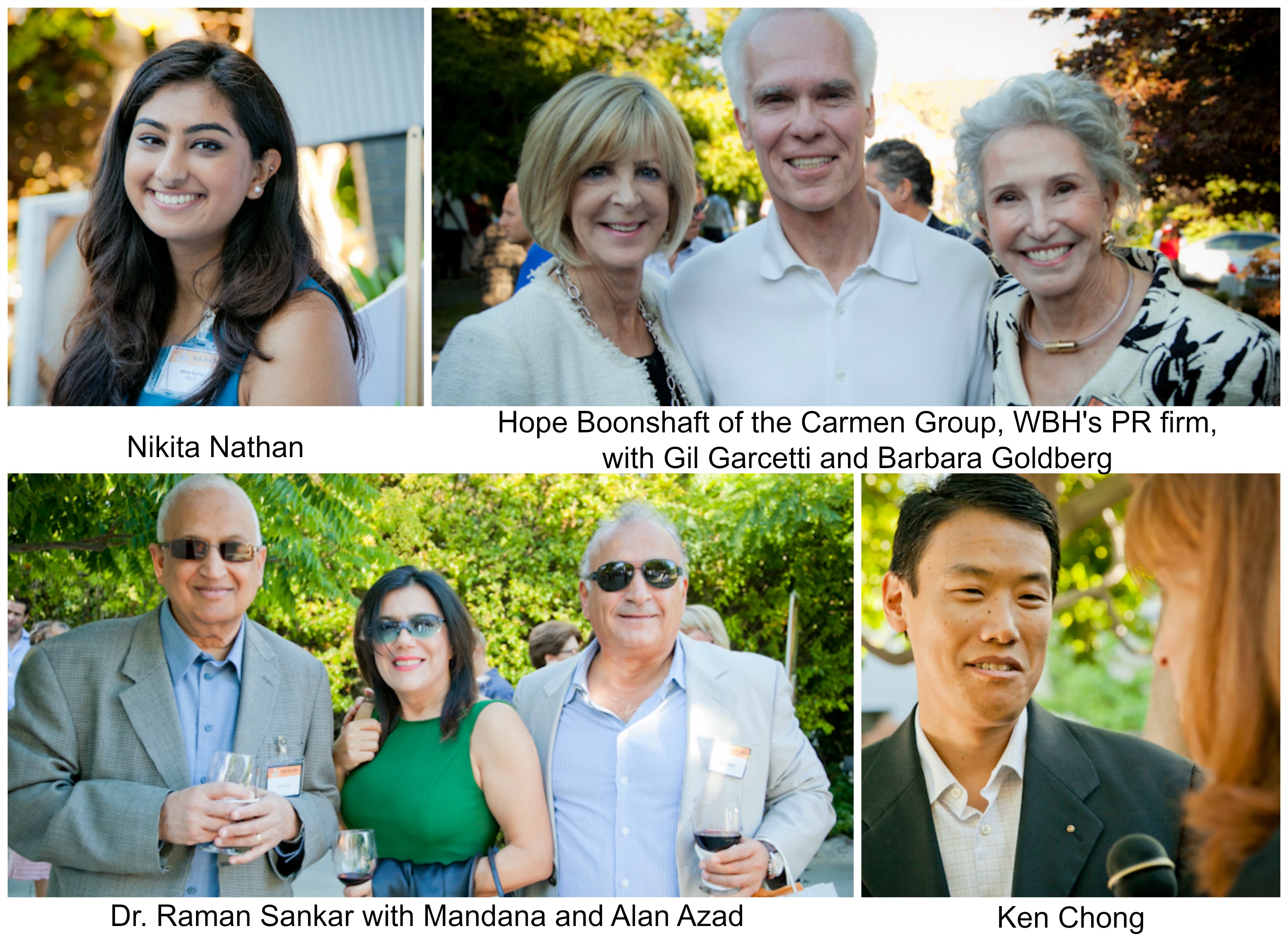 |
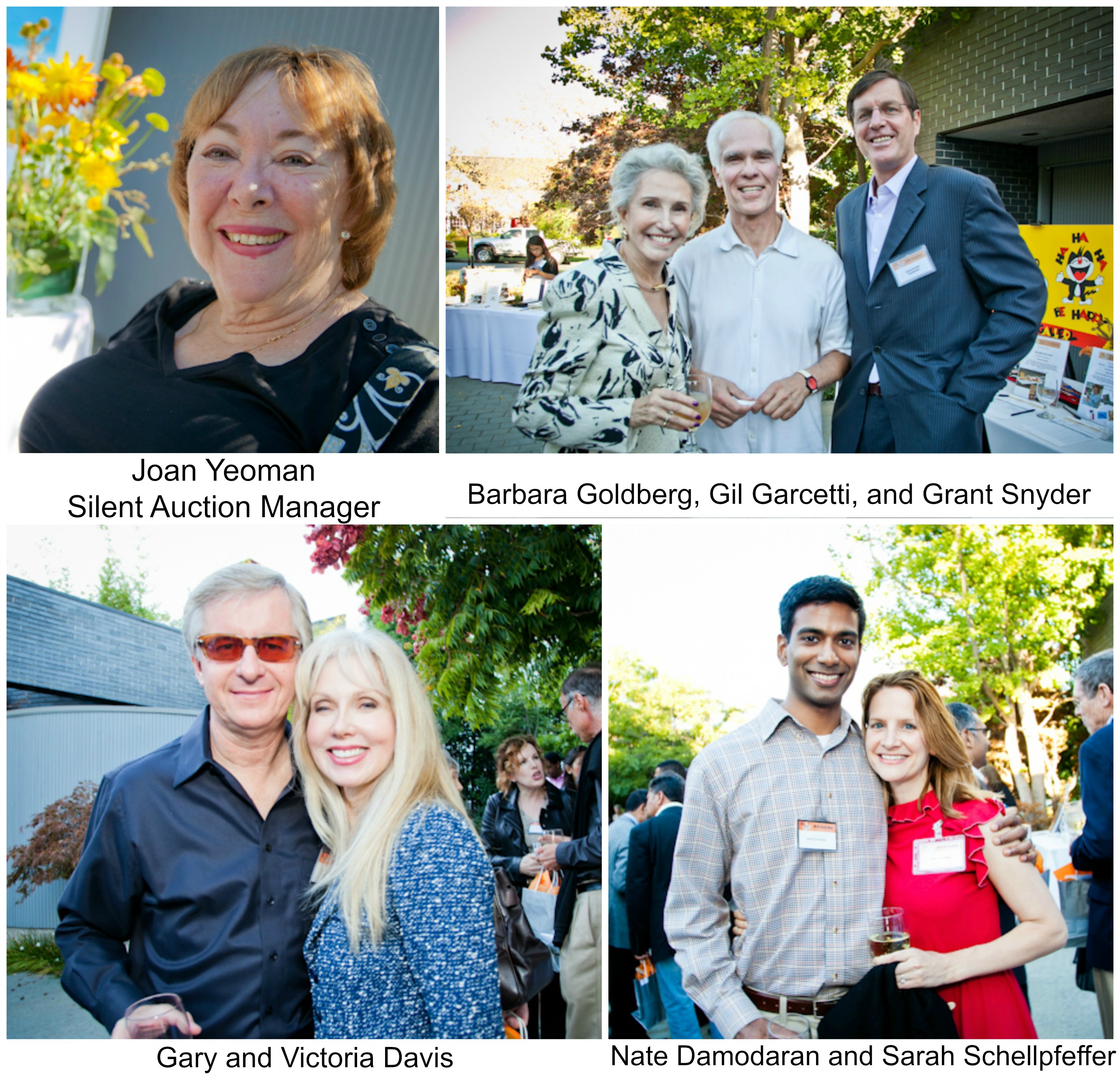 |
Once the silent auction ended, everyone made their way to the backyard.
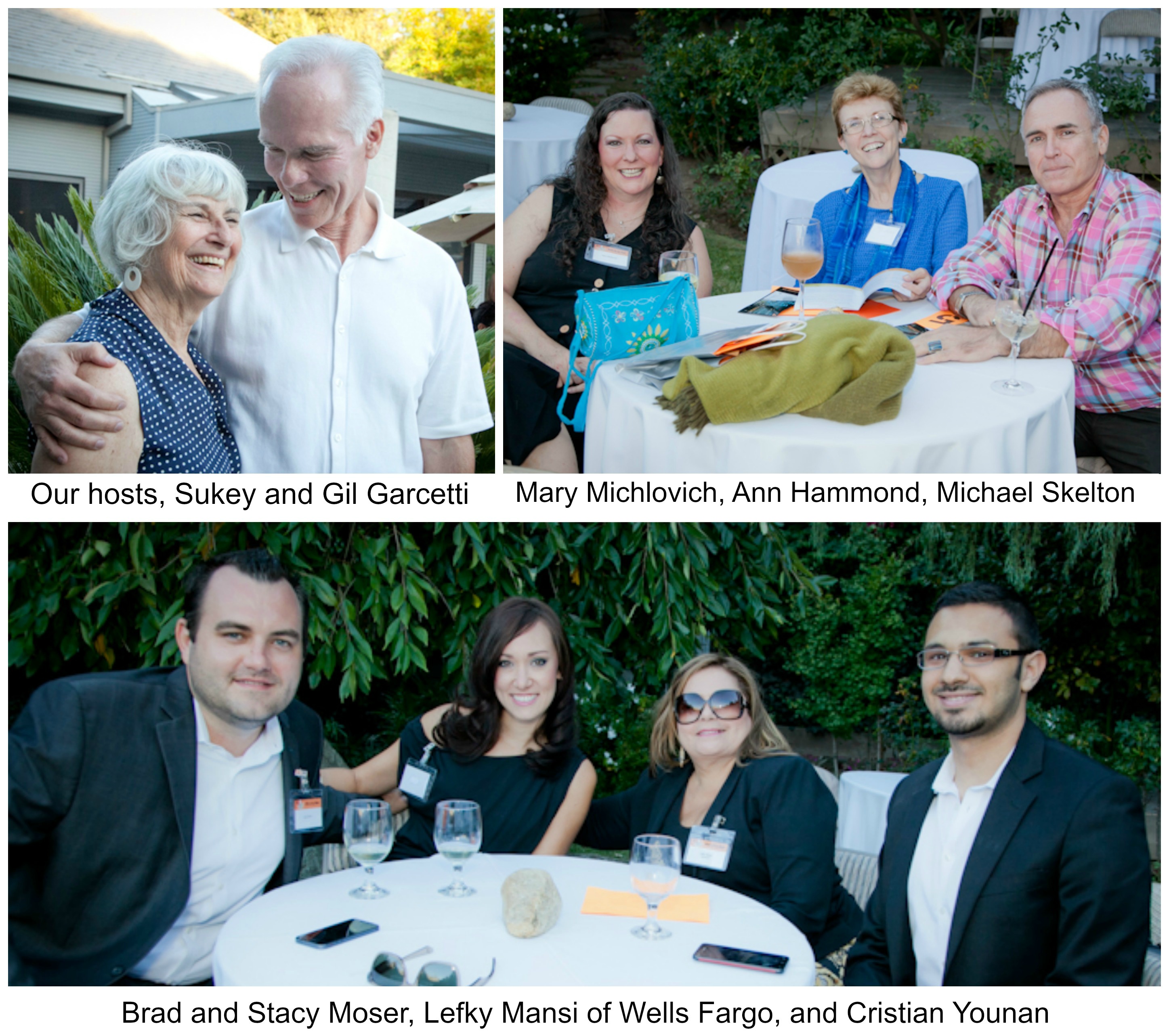 |
After a few words from our president and founder, Barbara Goldberg, Gil introduced Wells Bring Hope’s youngest supporter, Sedona Goldstein. Mayor Garcetti then came forward to talk about the many accomplishments of our honoree, Kareem Ahmed. Watch this segment shot earlier in the week by KNBC that aired on the 11 o’clock news after the event to see the unique connection that Sedona and Kareem share!
Following Barbara’s and Gil’s remarks, Grant Snyder, auctioneer extraordinaire, took the stage to auction off some amazing trips, some great art, and a chef’s dinner!
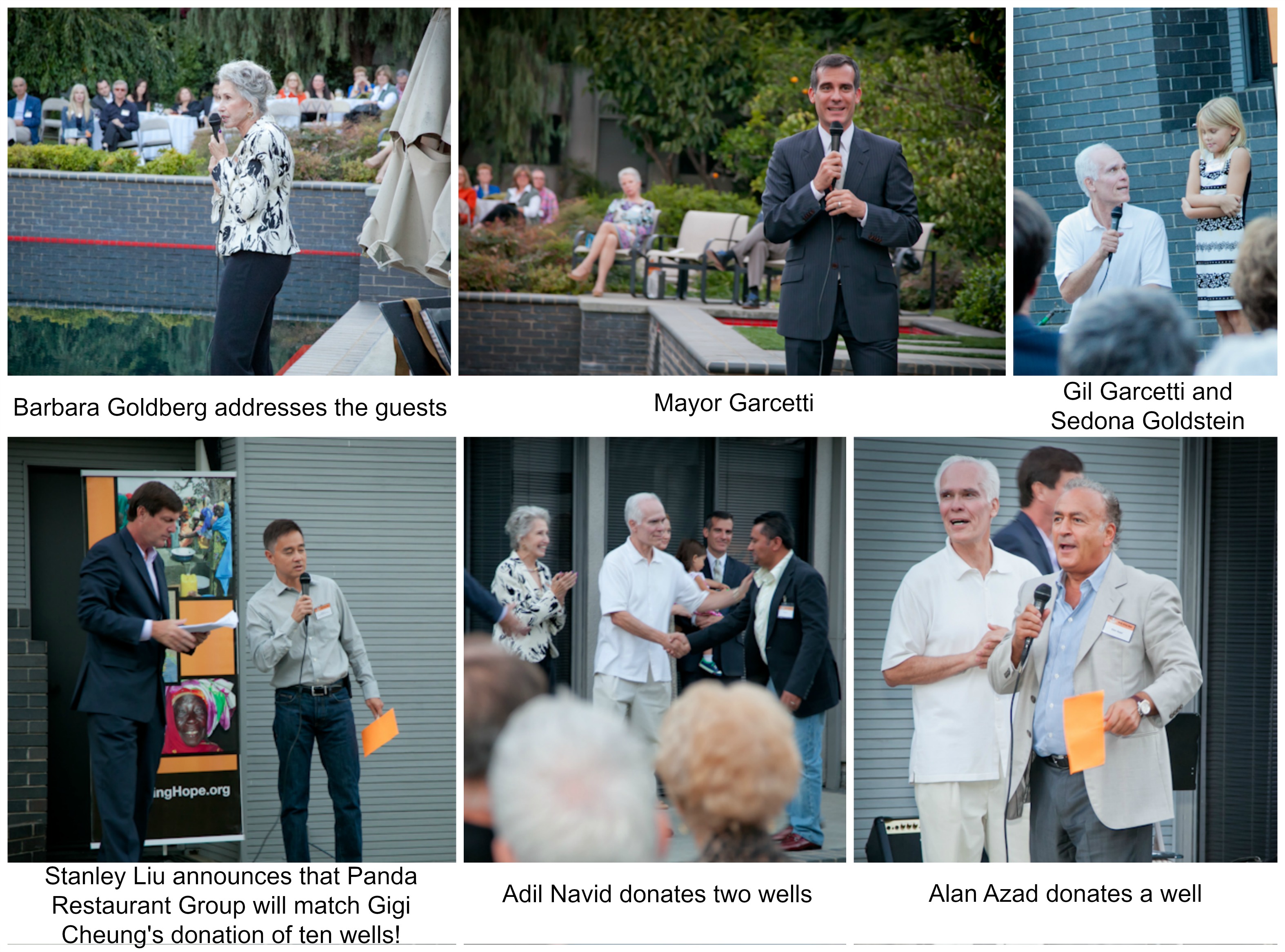 |
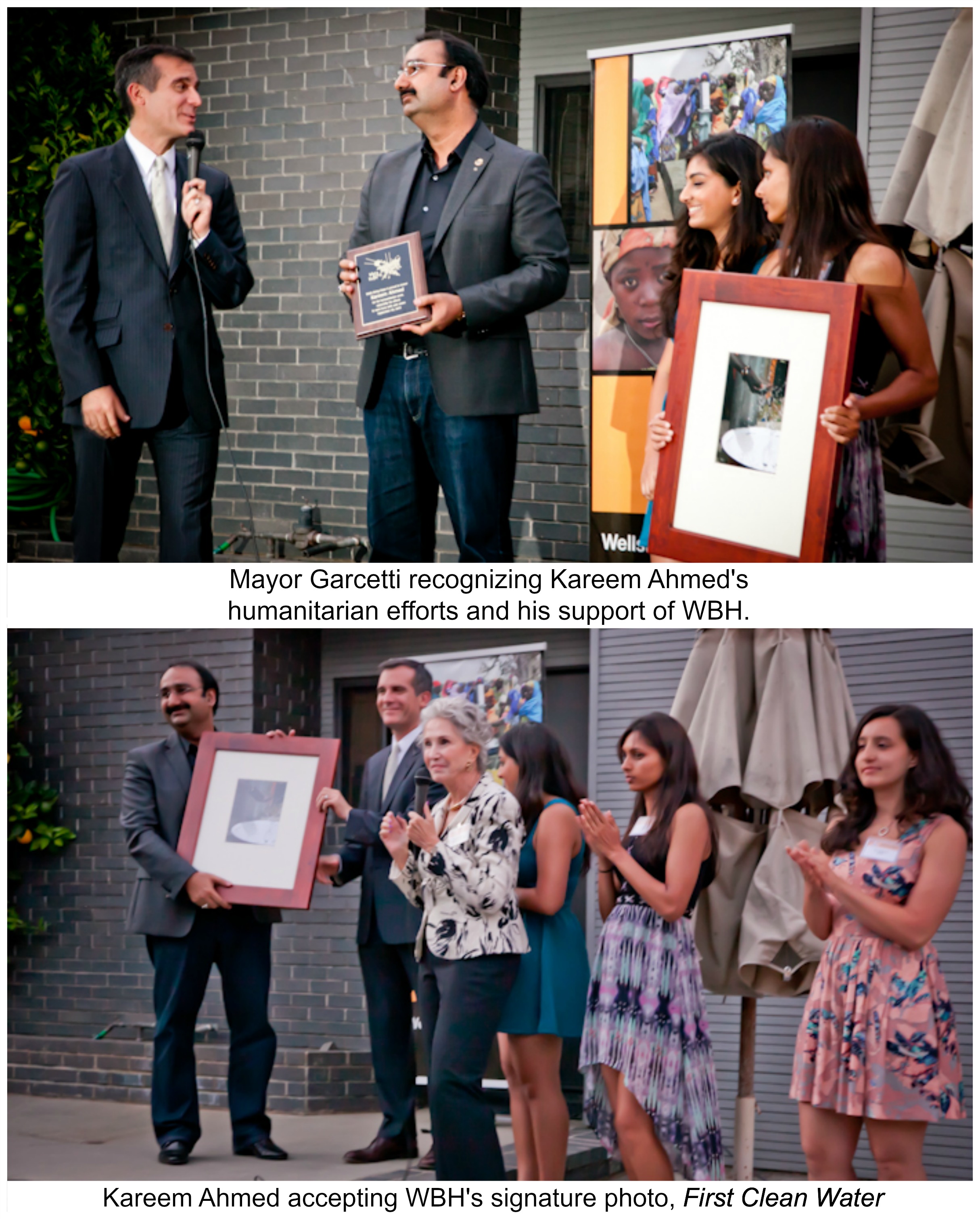 |
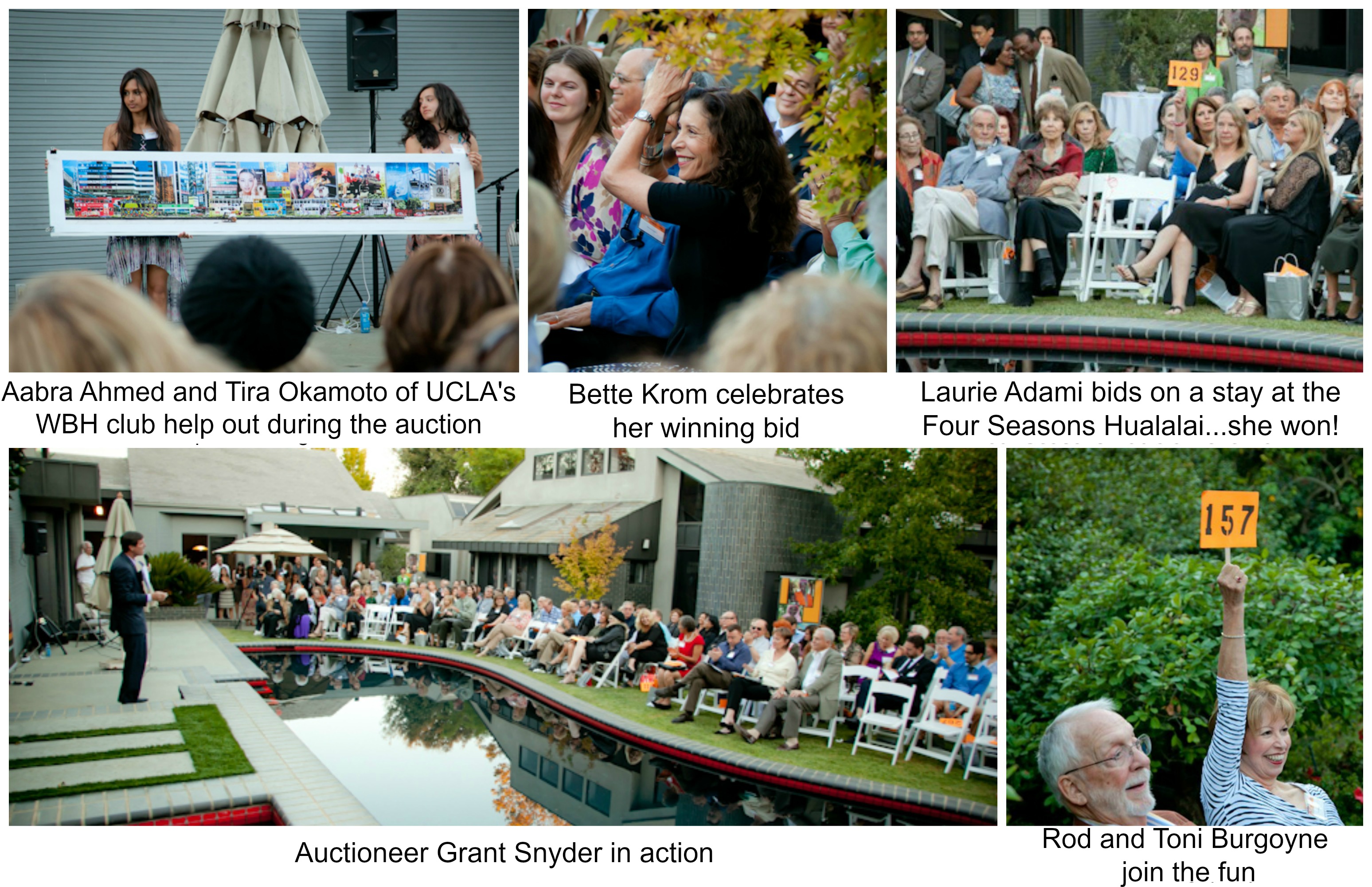 |
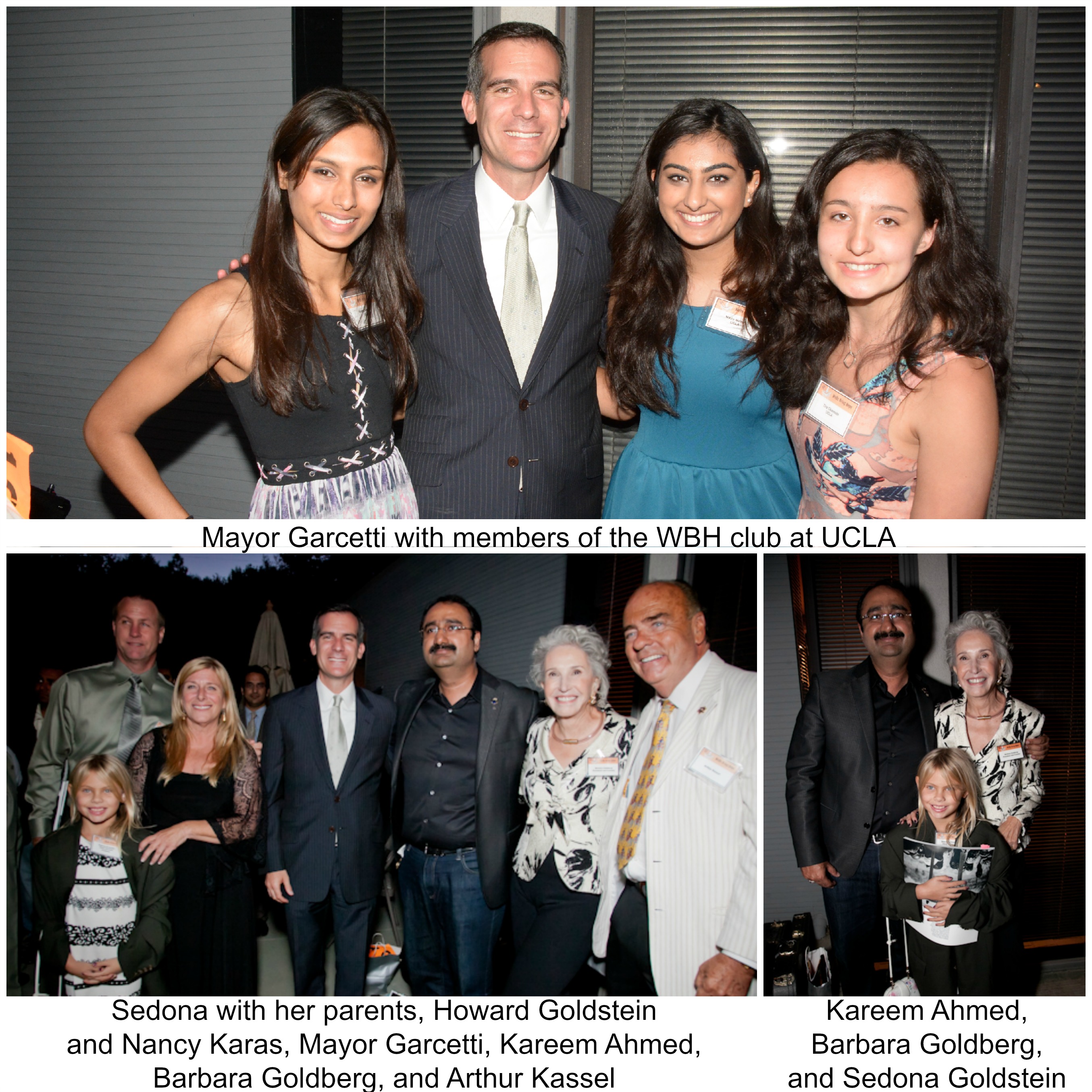 |
Save
Posted by Wells Bring Hope Team
by Kate Cusimano
 |
On Sunday, July 14th, Wells Bring Hope founder and president Barbara Goldberg once again opened her home to the many volunteers and supporters that make this organization possible. Special thanks to Debrah Lemattre of Stretch Media for taking all of these amazing photos!
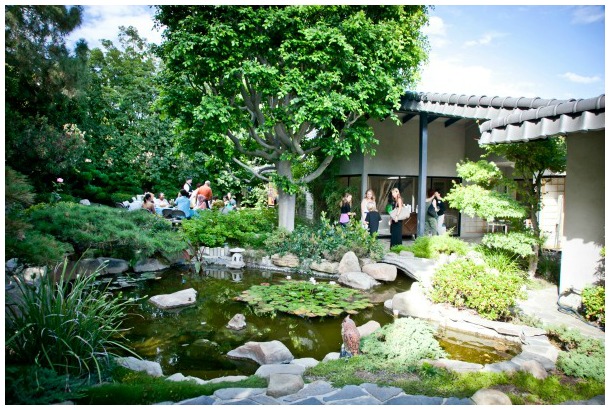 |
Volunteers new and old filled Barbara’s beautiful backyard – old connections were renewed and new friendships made.
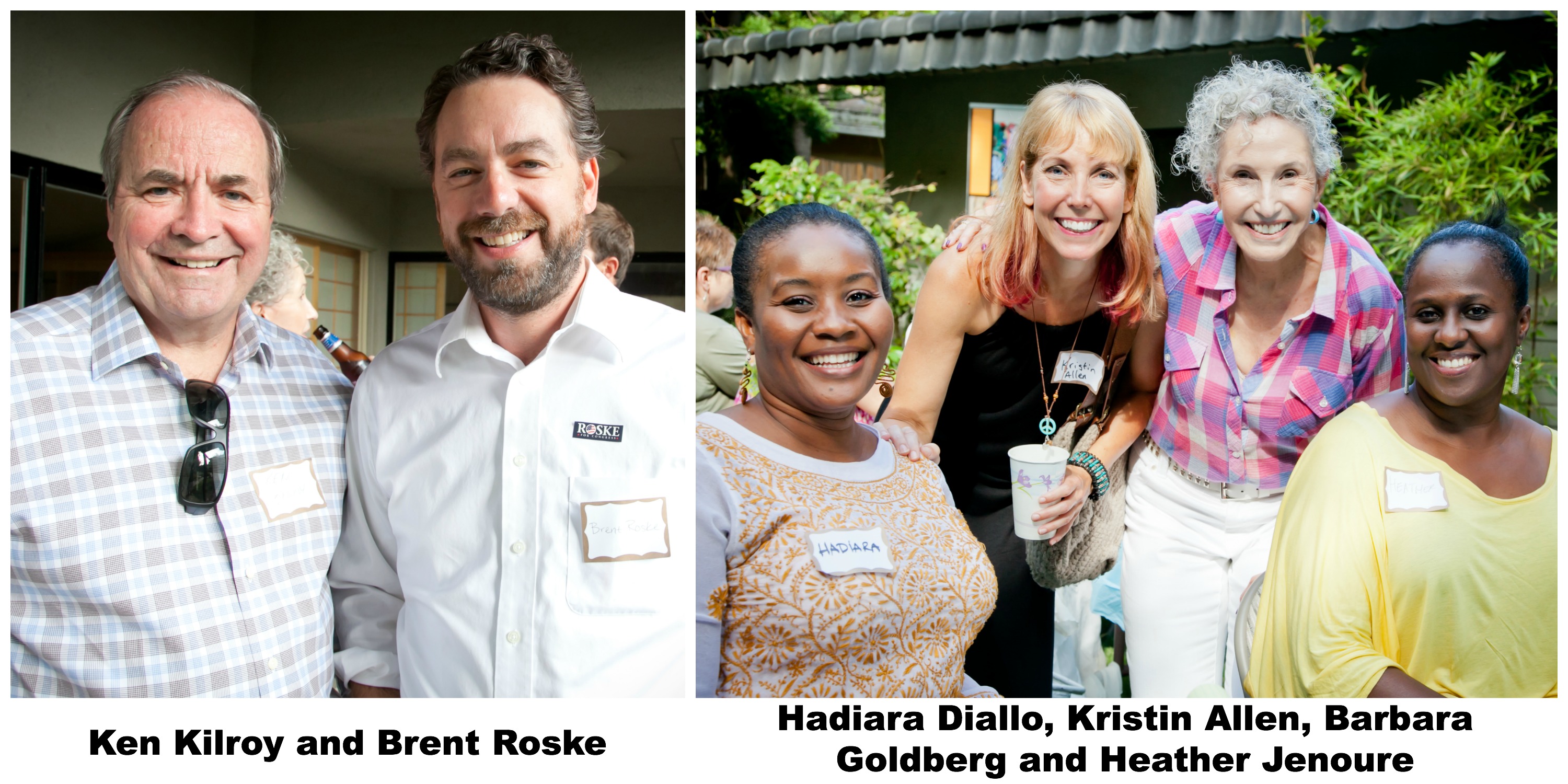 |
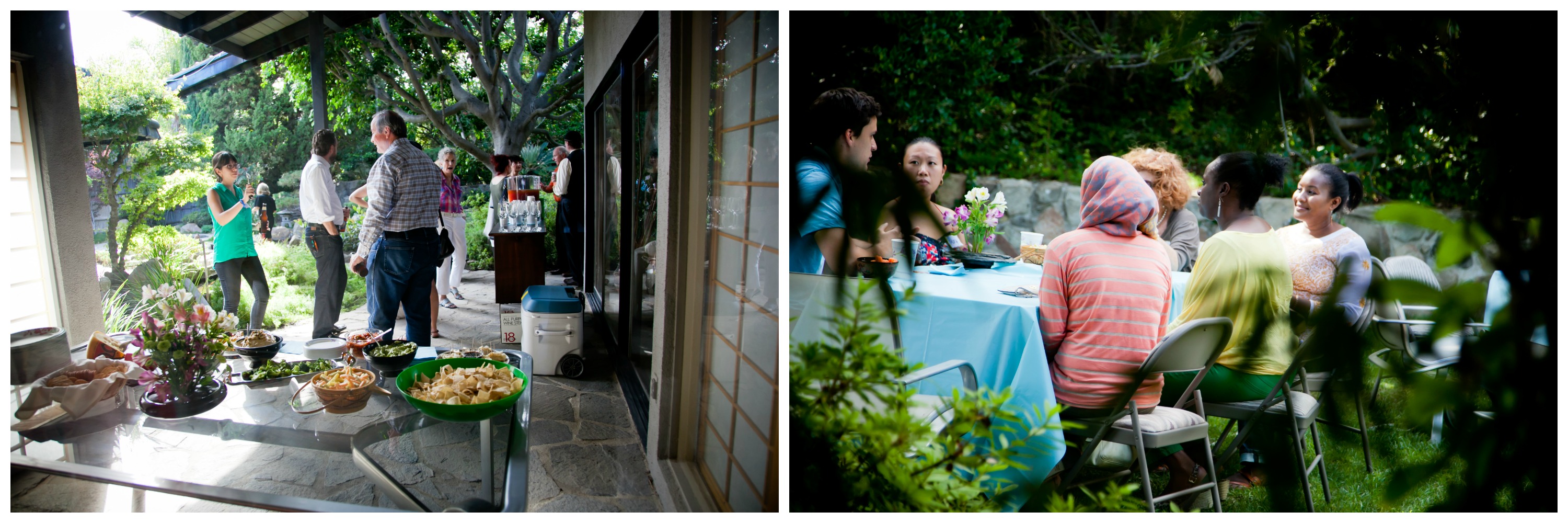 |
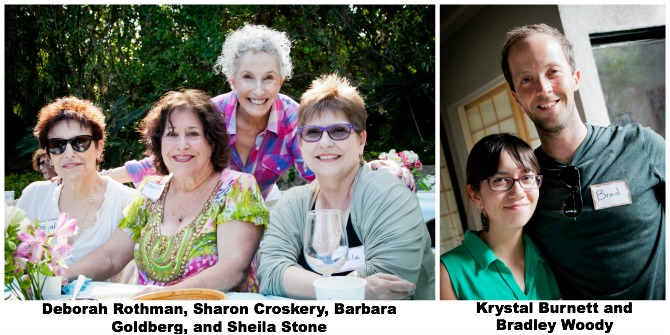 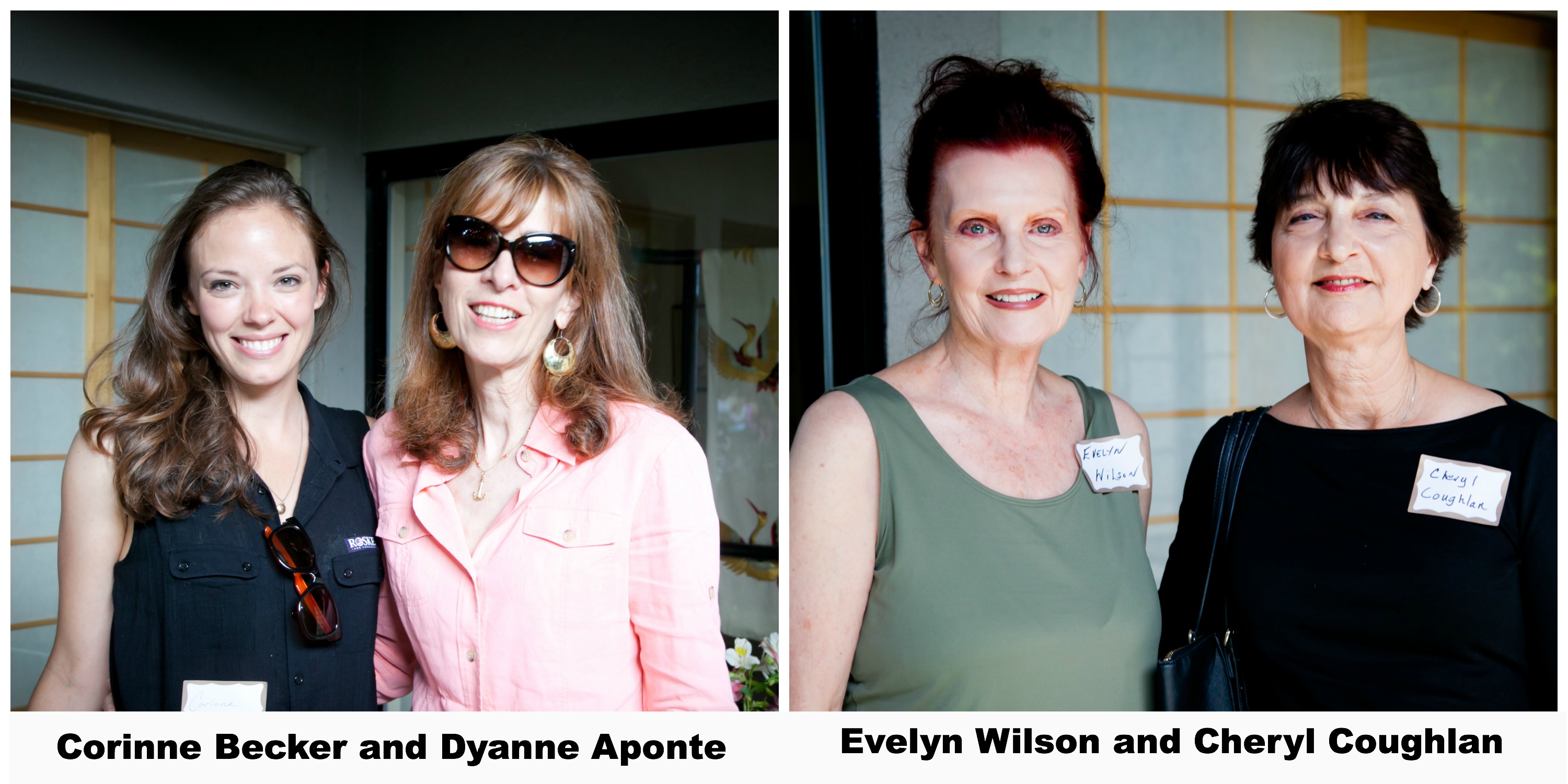 |
 |
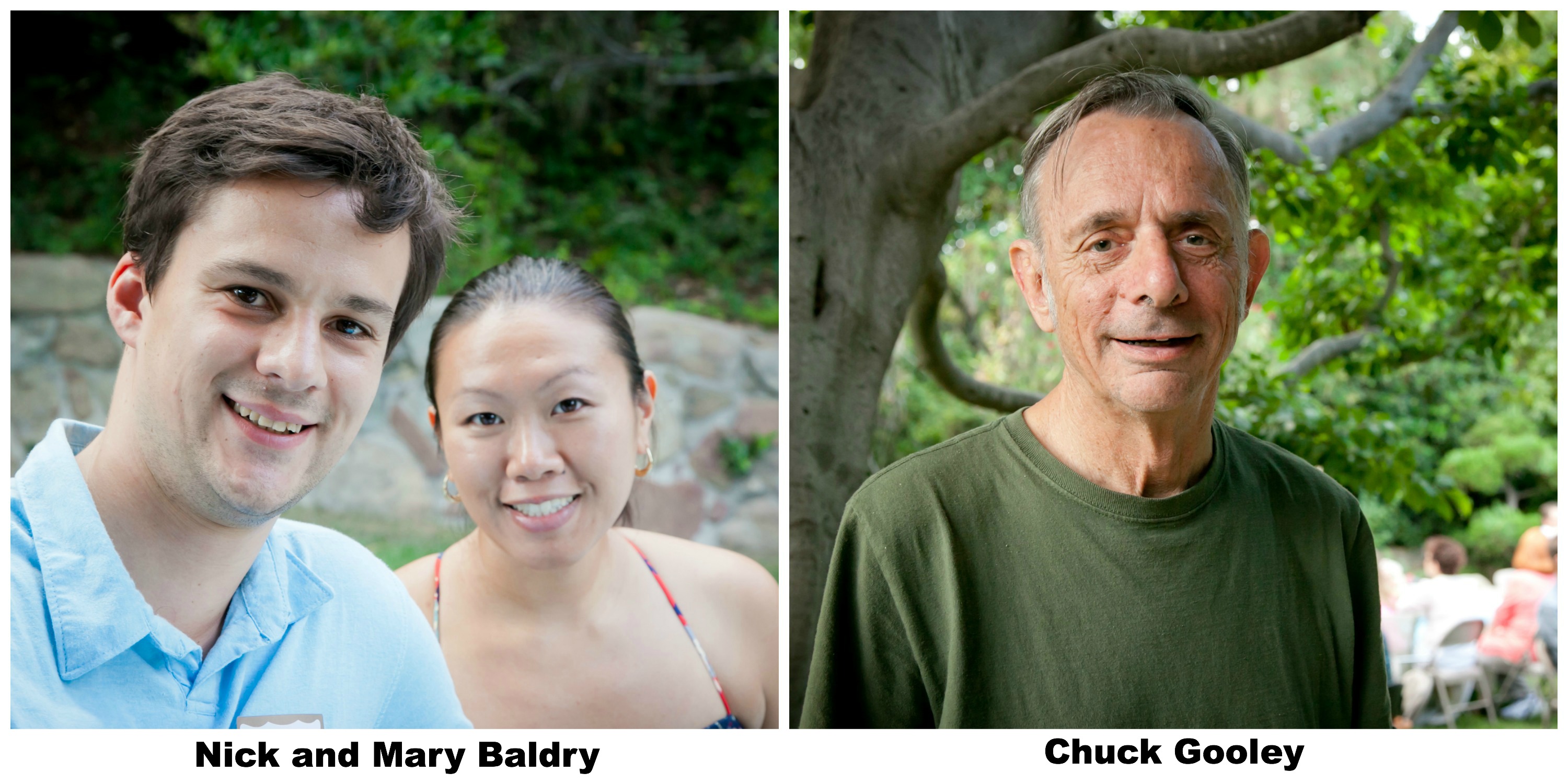 |
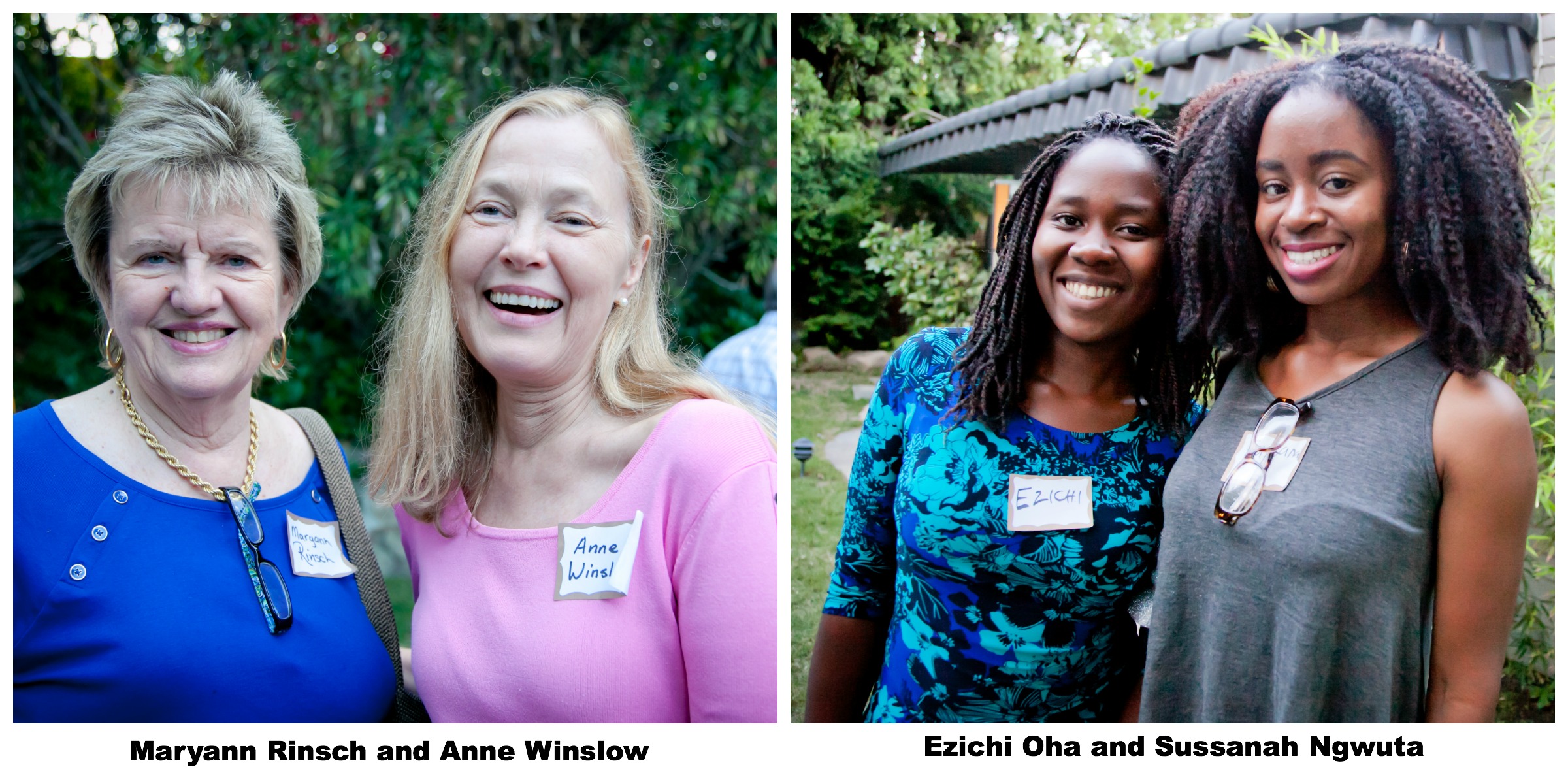 |
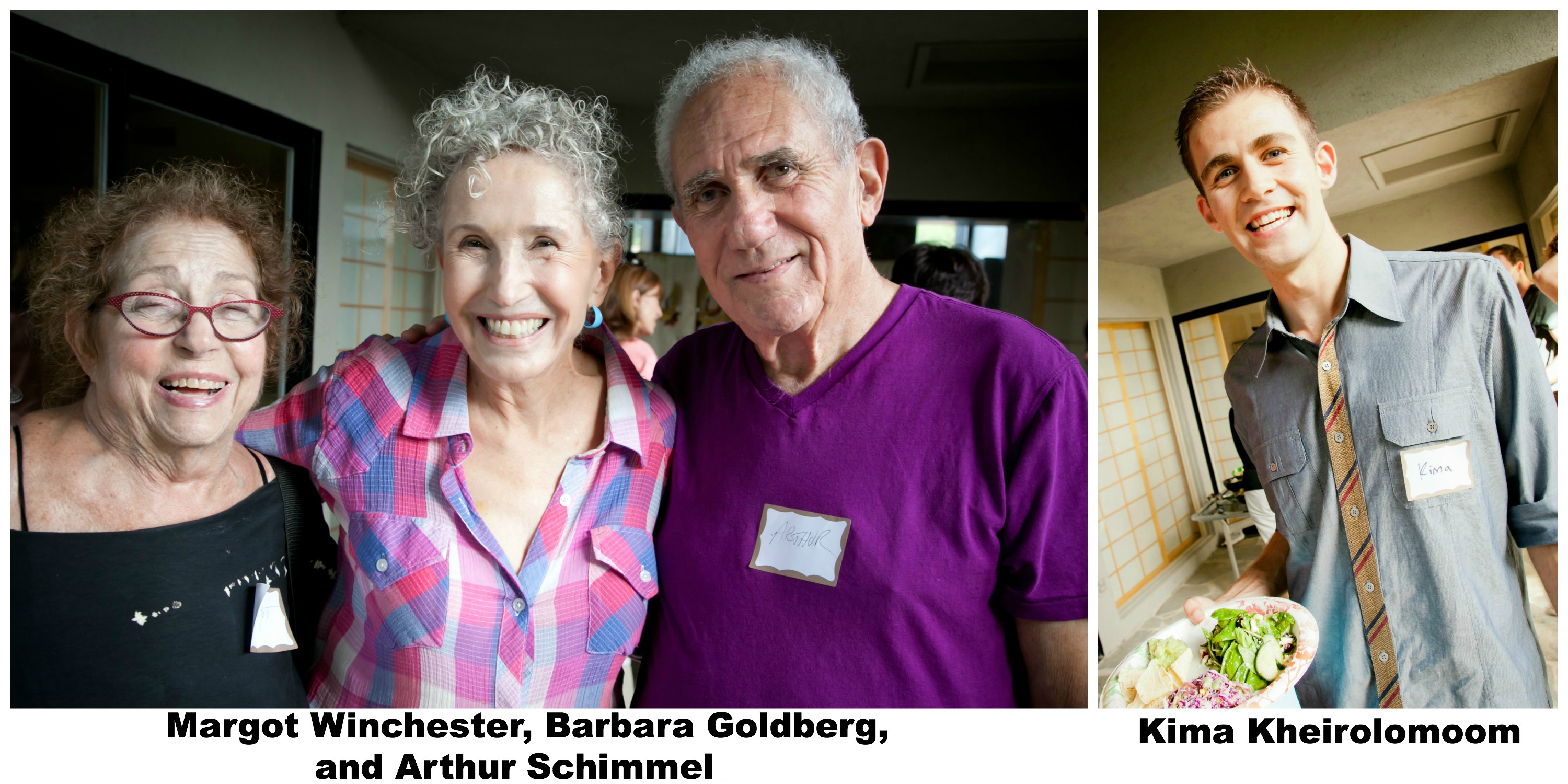 |
Making this summer’s barbecue extra special was the fact that we were joined by Mamane Amadou, Director of Water Operations for World Vision Niger and Sam Jackson, Director of Development for World Vision.
 |
After everyone had a chance to heap their plates with barbecued chicken and a variety of salads, Barbara began the program by announcing that Wells Bring Hope had just funded its 200th well!
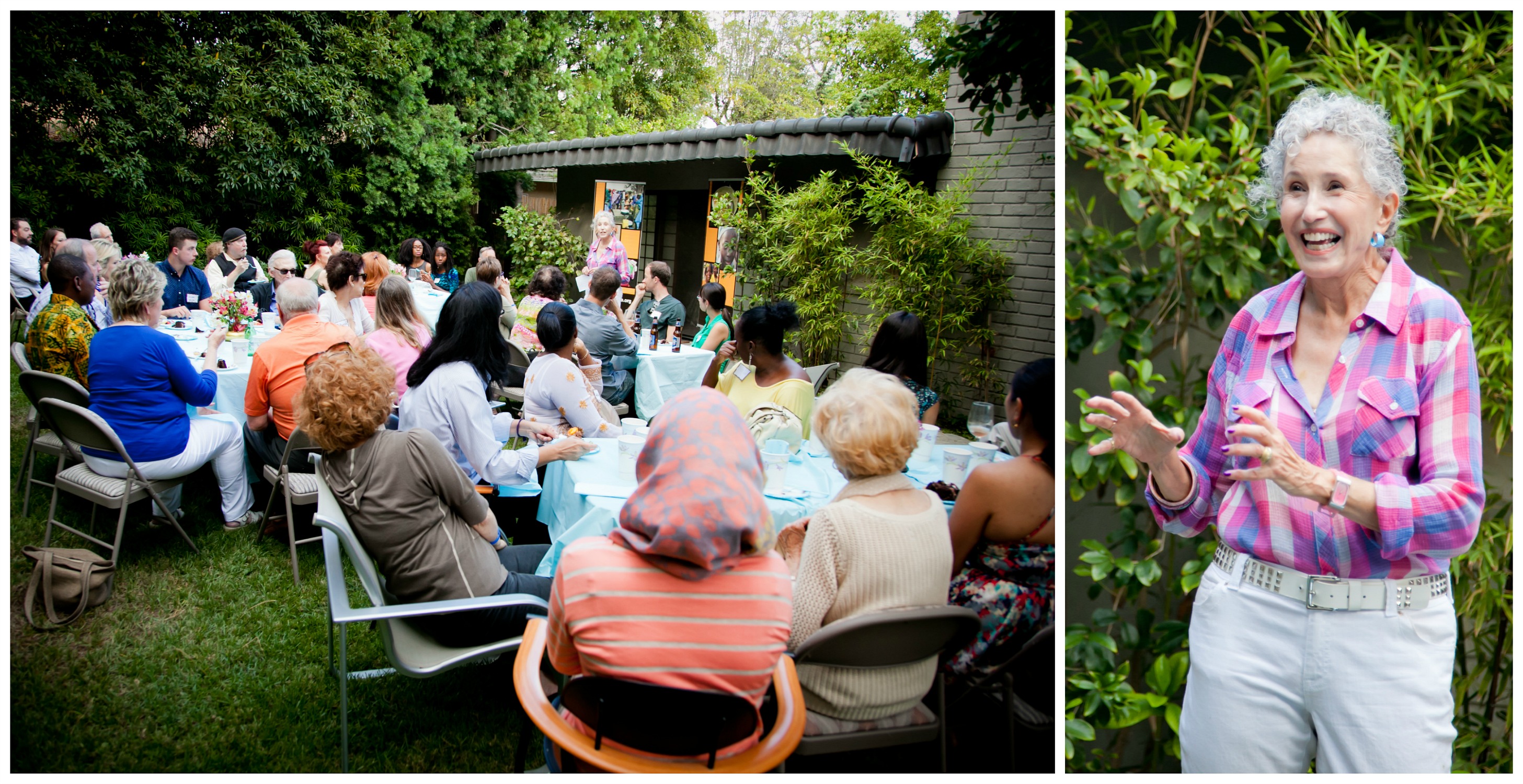 |
Following Barbara’s announcement, Sam Jackson spoke about Barbara’s phenomenal dedication to saving lives with safe water and how thankful World Vision is for her committment. After Sam’s remarks, Wells Bring Hope’s Director of Microfinance took center stage to introduce her fellow Nigerien, Mamane Amadou.

As Director of Water Operations for World Vision Niger, Mamane was able to provide the other guests with a unique perspective on the impact of the wells that WBH drills.
Following our illustrious speakers, I had the privilege of recognizing Evelyn Wilson and Basmah Rana as our volunteers of the year. As an organization that relies heavily on volunteers, Wells Bring Hope could not function without Evelyn and Basmah acting as our volunteer managers.
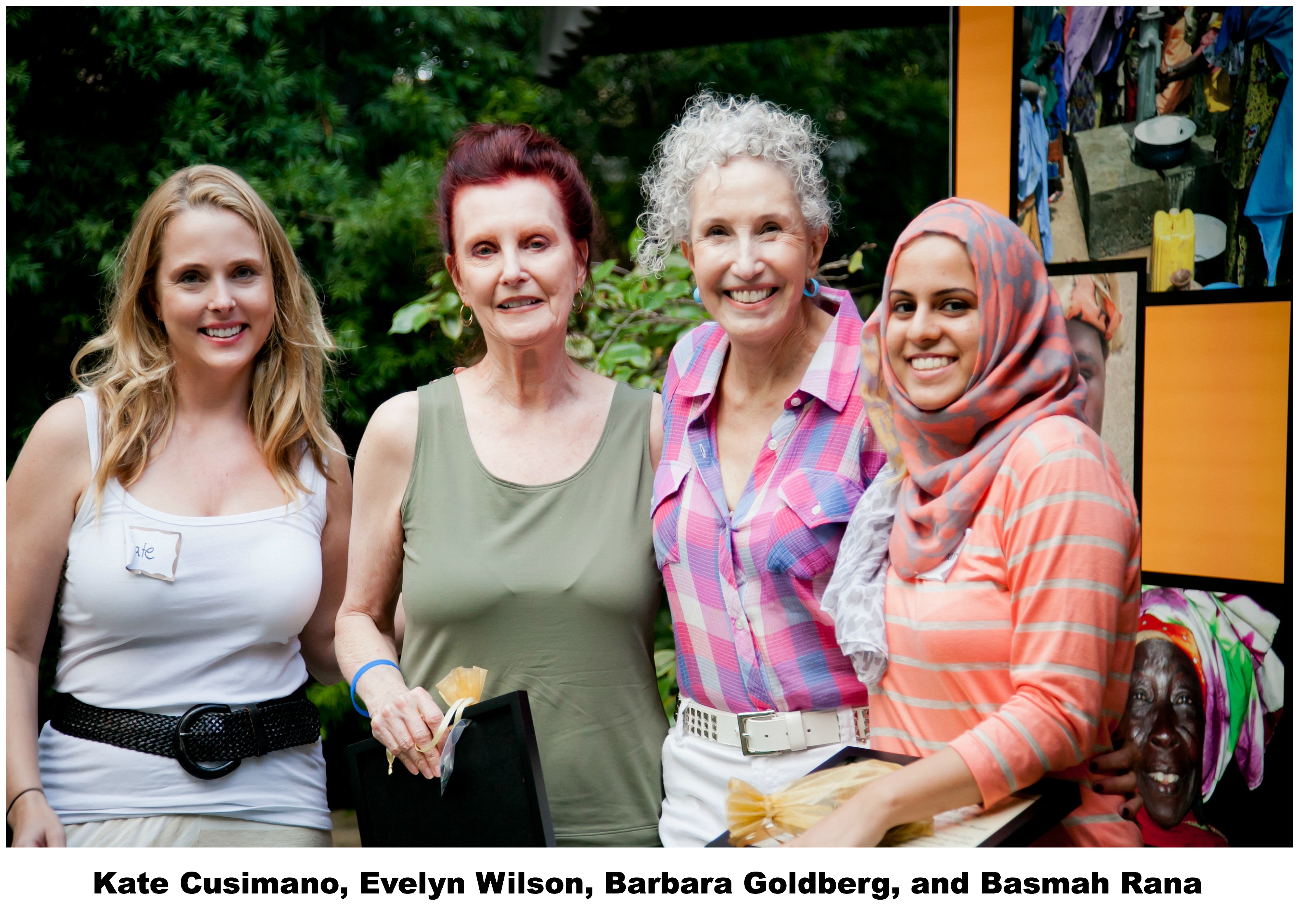 |
Next, Barbara presented Kristina Rietz with a special founders award to recognize her contribution to the birth of Wells Bring Hope. Kristina has been a supporter since the inception of Wells Bring Hope and was integral to getting the organization off the ground.
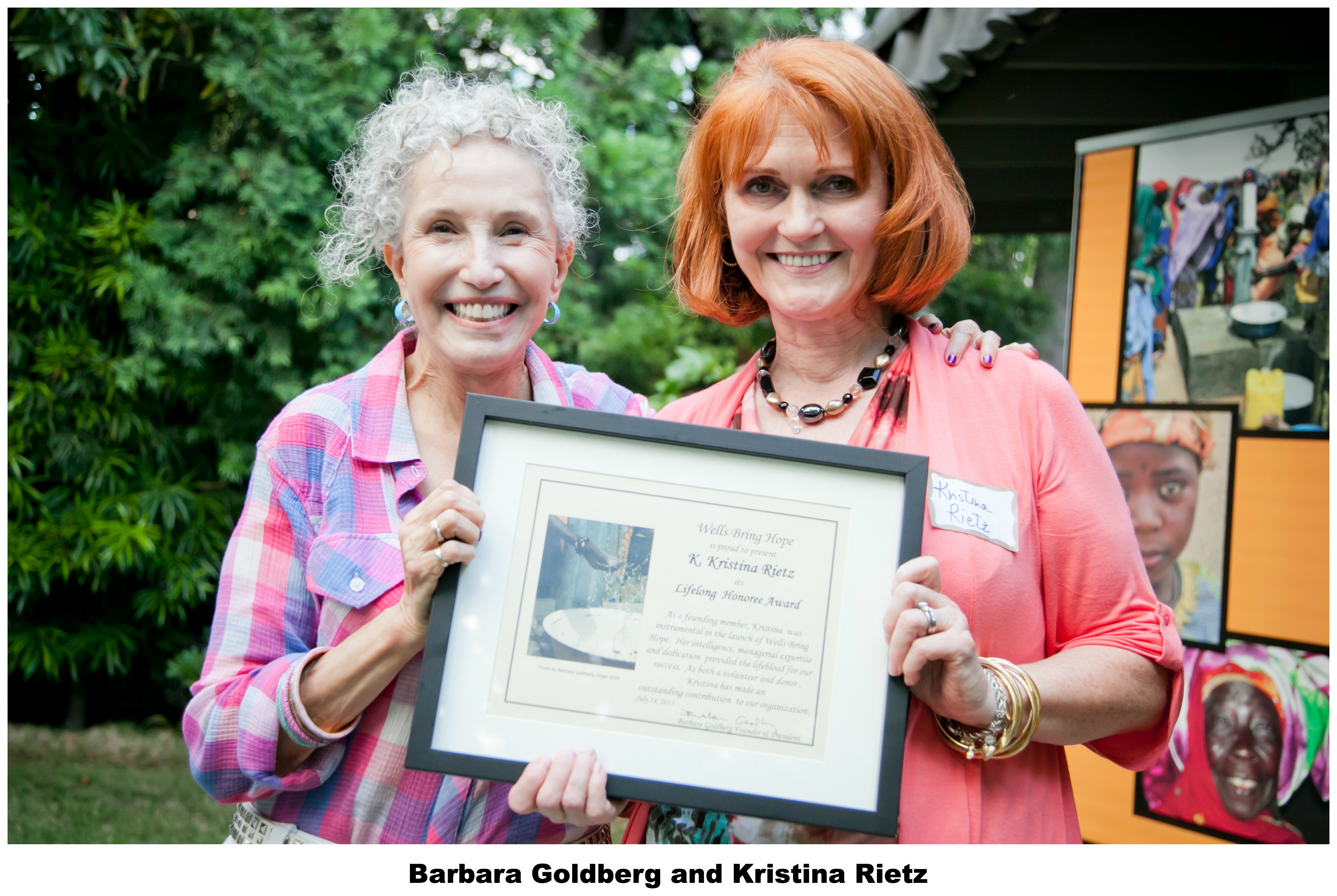 |
Finally, we raffled off some Wells Bring Hope goodies from our online store.
 |
Thanks to all who made this such a spectacular event!
Save
Posted by Wells Bring Hope Team
by Lauren Cohen
You already know that Wells Bring Hope is committed to drilling wells to bring safe water and sanitation to rural villages in Niger, West Africa. But how much do you know about the country and the people that we serve?
Did you know…
• The official language of Niger is French.
 |
| {source: riekhavoc} |
• The Nigerien flag is perfectly square in shape and the colors of orange, white, and green stand for the Sahara desert, purity and innocence, and green vegetation and fruitful agriculture respectively.
• Niger and the Democratic Republic of Congo are tied for last place on the U.N.’s Human Development Index.
 |
| Niger River {source: Guillaume Colin & Pauline Penot} |
• The word “Niger” is derived from the Tamashek phrase “gher n-gheren,” meaning “river among rivers.”
• The currency of Niger is the CFA Franc. $1 = 500.25 CFA
• Niger is divided into seven regions and one single capital district.
• Niger is nicknamed “Frying Pan of the World,” due to its being one of the hottest countries in the world.
• In May 2004, slavery was declared illegal in Niger.
• According to a 2012 survey, there are approximately 212,480 internet users in Niger. That’s just 1.3% of the population.
• Niger’s exports include uranium ore, livestock, cowpeas, and onions.
• Niger’s imports include foodstuffs, machinery, vehicles and parts, petroleum, cereals.
• There is no official religion for the people of Niger, however 90-95% of the population is Muslim.
• Hausa people are the largest ethnic group in Niger, comprising 55.4% of the population.
• The northern mountains of Niger are called Aïr.
• The capital city of Niger is Niamey.
• The main crops of Niger are sorghum and millet.
• The lowest point in Niger is the Niger River with an elevation of 200 meters. The highest point is Mont Idoukal-n-Taghes at 2,044 meters.
• Wildlife in Niger include buffalo, elephants, West African lion, Northwest African cheetah, roan, antelope, and warthogs.
 |
| Roan Antelope {source: Pablo Escovado} |
• Niger won its independence from France in 1960 and experienced single-party and military rule until 1991 when General Ali Saibou was forced in 1993 by public pressure to allow multiparty elections, which resulted in a democratic government.
Anyone can ask for help for a certain cause, organization, or country. However, when you begin to learn more about your chosen cause, when you understand a little more about the culture and the daily realities of the areas that are benefiting from your generosity, you gain a deeper understanding of the people whose lives you are changing.
Sources:
http://lifestyle.iloveindia.com/
http://www.funtrivia.com/
http://www.mapsofworld.com/niger/information/facts.html
http://niger.facts.co/
CIA World Fact Book
http://www.10-facts-about.com/Niger
Save
Posted by Wells Bring Hope Team
Wells Bring Hope is proud to announce a milestone to celebrate–200 wells in five years! That's 130,000 lives transformed by safe water in the poorest country in the world. Thanks to all of the volunteers, supporters, and donors whose compassion in action made this possible.
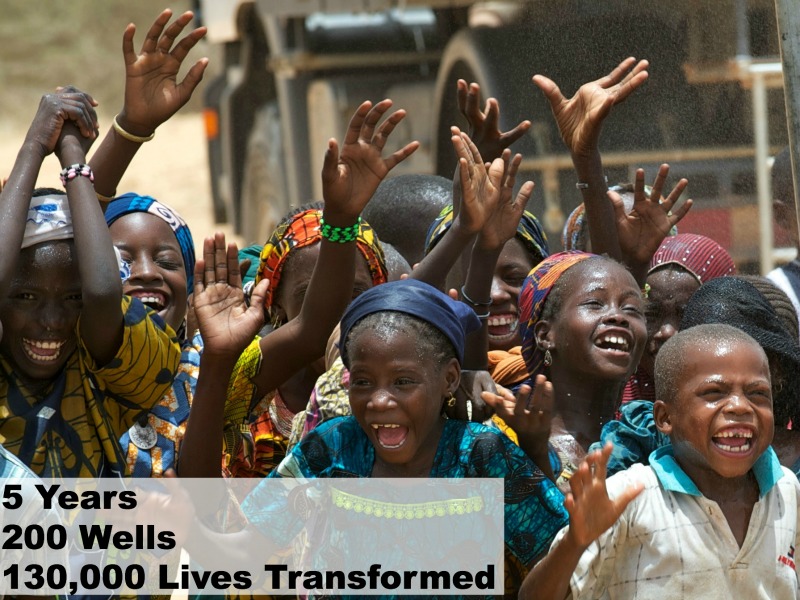 |
| {photo by Ken Kilroy} |
Director of Operations
Phone: 802.233.6254
Mailing Address:
16563 Park Lane Circle
Los Angeles, CA 90049

Saving Lives with Safe Water
Wells Bring Hope is a 501(c)(3). Read our Privacy Policy. © Copyright 2024 Wells Bring Hope. all rights reserved.